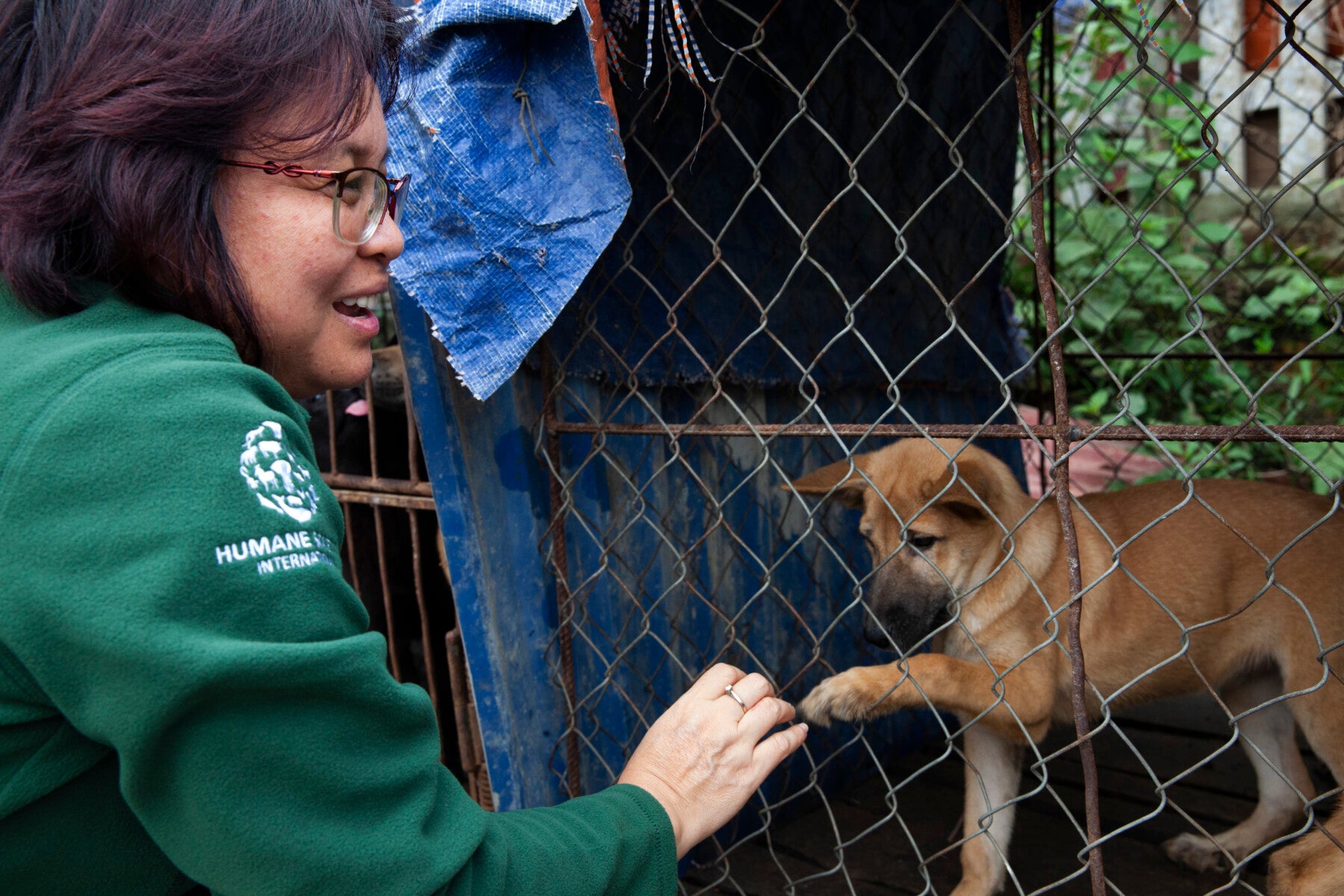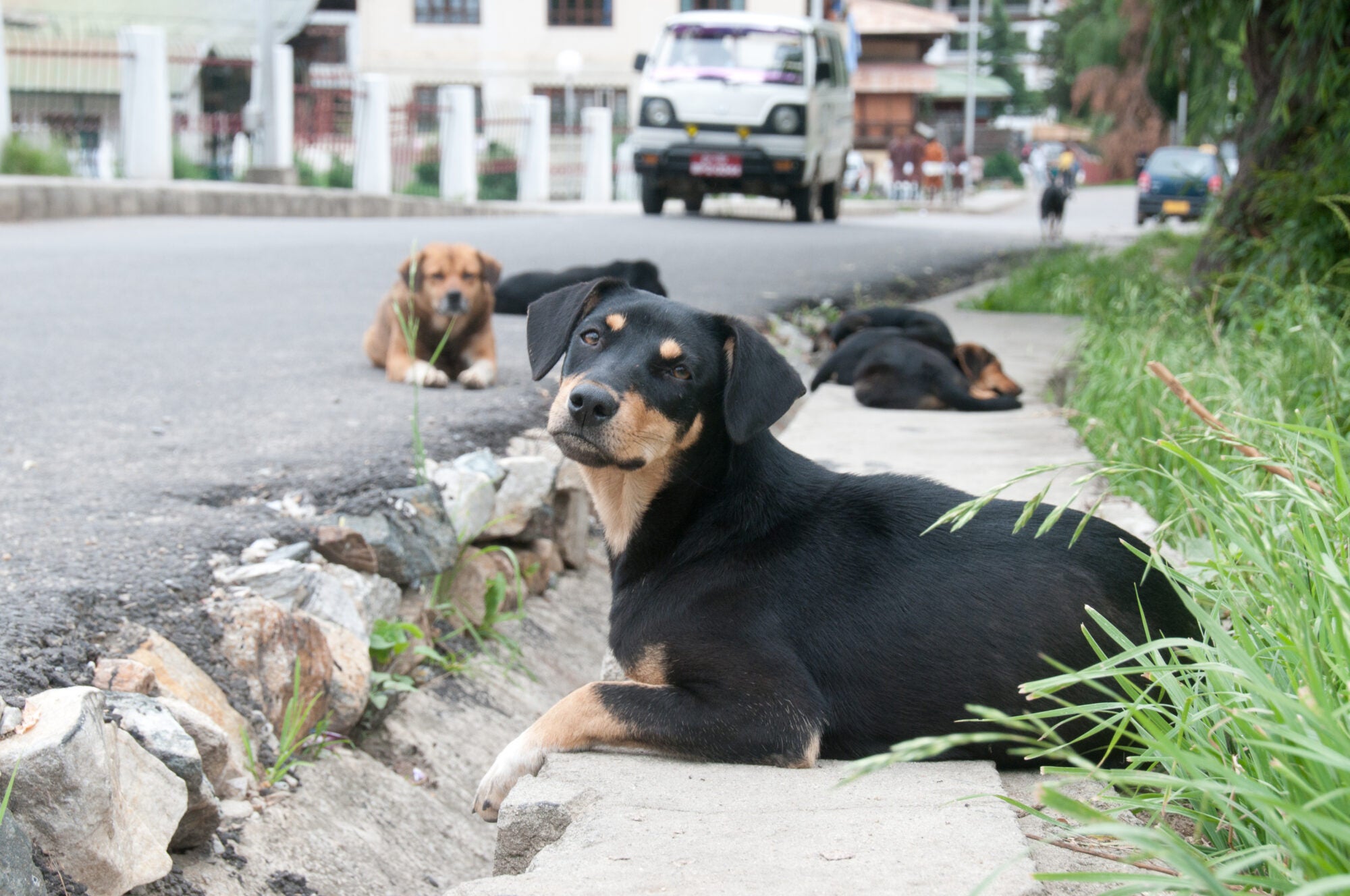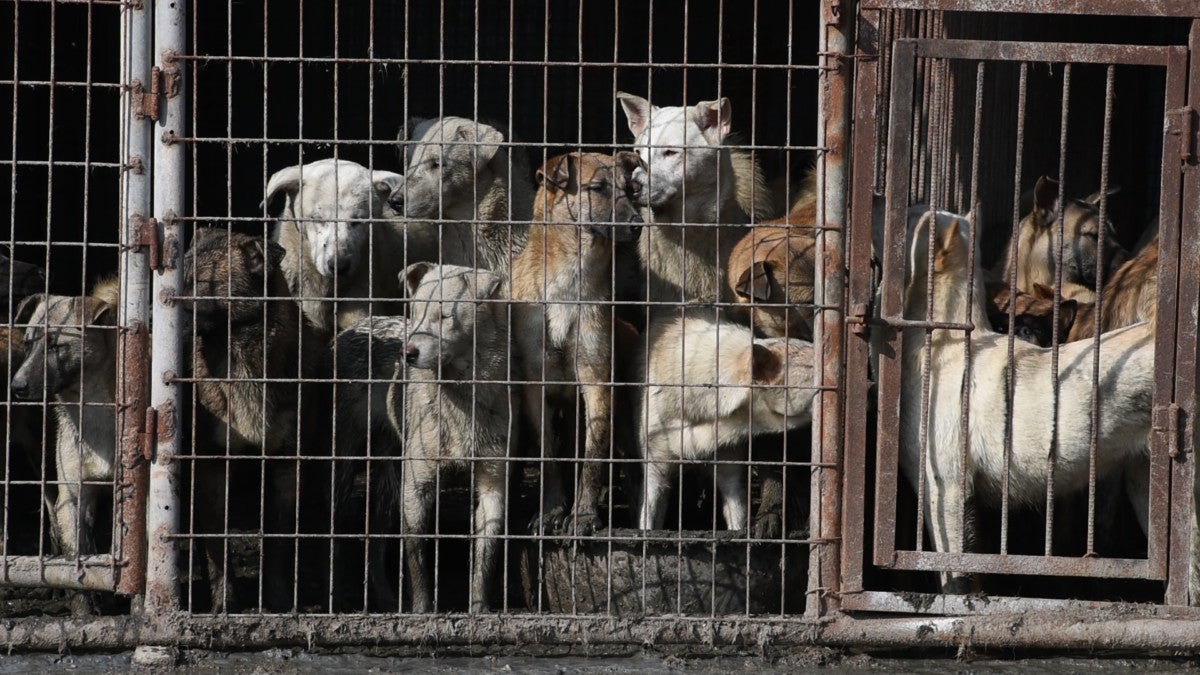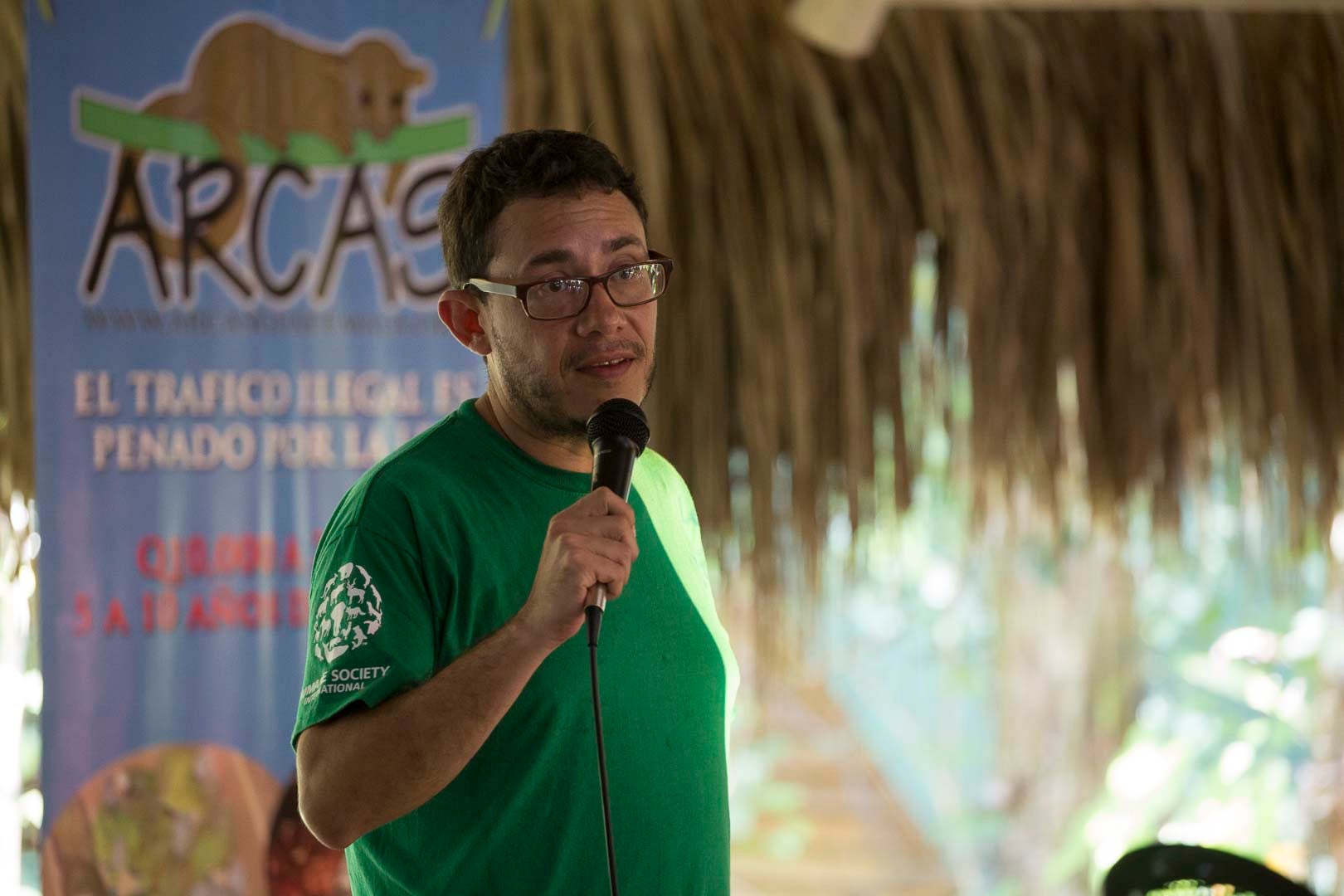
HANOI, Viet Nam—The owner of a dog slaughterhouse and dog meat restaurant in Viet Nam, which killed thousands of dogs for human consumption over the past five years, has become the first in the country to take part in a new Models for Change program by animal protection group Humane Society International. The program helps people transition out of the cruel and dangerous dog meat trade.
Forty-year-old Mr Hiep of Thai Nguyen province—a dog meat hotspot—was eager to work with HSI’s team in Viet Nam to permanently close his dog meat business and stop slaughtering dogs, because he believes killing the animals brought his family bad luck. His business was responsible for killing an average of 10-15 dogs every day. HSI and officials from the Departments of Agriculture and of Animal Health were on site to help Mr Hiep close down his slaughter operation and rescue 18 dogs found alive at the property.
HSI’s Models for Change program is coming to Viet Nam after successfully operating in South Korea since 2015, where the HSI has closed down 17 dog meat farms so far, rescuing more than 2,500 dogs and helping dog farmers transition to more sustainable livelihoods such as chili or water parsley growing.
As well as tackling the tremendous animal cruelty associated with the capture, trafficking and slaughter of an estimated five million dogs a year for human consumption across Viet Nam, HSI’s Models for Change program will also provide workers with a way out of a trade that is known to facilitate the spread of the deadly rabies virus in Viet Nam. Rabies kills more than 70 people in Viet Nam each year, according to the World Health Organization, with most cases caused by dog bites, and several verified cases linked to dog slaughter and even dog meat consumption. Last month, authorities in Hanoi reported the death of a man who contracted rabies after slaughtering dogs for meat.
Phuong Tham, Humane Society International’s country director in Viet Nam, said: “We are very proud to bring our Models for Change program to Viet Nam. The dog meat trade is not only unbelievably cruel, but also poses a very grave risk to human health from the transmission of potentially lethal diseases like rabies. Mr Hiep is the first of what we hope will be many more people to leave this dangerous trade behind them, helping the government achieve its goal of eliminating human rabies deaths from dog interactions by 2030. We recognize that many people involved in the dog meat trade are keen to leave due to low profitability, societal and family shame as well as fears of bad karma. We hope our Vietnamese Models for Change program will become a key component of Viet Nam’s strategy to provide industry workers with alternative and economically viable livelihoods, whilst also supporting the government in its efforts to eliminate rabies.”
The 18 dogs rescued, some of whom had been locked up in cages for fattening to reach slaughter weight, were vaccinated against rabies and distemper, and moved to a nearby HSI-supported, temporary care and rehabilitation facility at the Thai Nguyen University of Agriculture and Forestry, to receive necessary medical care before being considered for local and international adoption. Mr Hiep plans to transform his business to sell agricultural services such as crop fertilizer, as well as groceries, green tea, beer and snacks to waiting customers.
Mr Hiep said: “I know in my heart that killing and eating dogs is wrong, and it was becoming harder and harder for me to do it. I am convinced that being part of this trade was bringing my family bad karma, so I am relieved to work with HSI in Viet Nam to end this chapter in my life and start afresh. The risk of spreading rabies through the dog meat trade is something we should all take very seriously, so I feel proud to be standing up for change in my community, and happy to know that the dogs who have been saved will be able to live new lives with families. It’s a good outcome for me, the dogs and my community.”
HSI conducted research in Thai Nguyen and Hanoi to establish that Viet Nam’s dog meat trade is largely supplied through snatching dogs from the streets or stealing pets from private homes. Traders frequently use poison bait such as meatballs laced with cyanide, and catch the dogs using painful taser guns and pincers. Pet theft and the arrest of pet thieves is frequently reported in the Vietnamese media, and devastated pet owners often buy back their beloved companions if they are fortunate enough to locate them after capture. Traders also go village to village by motorbike to purchase dogs from rural communities that occasionally sell “excess” dogs for extra income. Once there is a sufficient number of dogs to fill a truck, they are tightly packed into small cages and driven for hours or even days, many sustaining injuries as well as enduring exhaustion, dehydration, suffocation, heatstroke and even death before the truck reaches its final destination – a slaughterhouse, market or restaurant.
The link between rabies transmission and the dog meat trade has been well established by the World Health Organization, and the virus’s elimination is undermined by continued dog meat trade activities. Studies by the National Institute of Hygiene and Epidemiology demonstrate that a significant percentage of patients in Viet Nam who become infected with the virus after contact with dogs, do so not due to a bite but after killing, butchering or eating dogs. The link between rabies and the dog meat trade is so well established that in 2018 and 2019, authorities in major cities such as Hanoi and Ho Chi Minh City urged citizens not to consume dog meat to reduce the risk of disease transmission.
Dr. Phan Thi Hong Phuc, dean of animal science and veterinary faculty at Thai Nguyen University of Agriculture and Forestry, said: “Rabies is endemic in Viet Nam, and the dog meat trade is a contributing factor to the spread of this virus to humans. So, we are very pleased to work with HSI in Viet Nam on Models For Change, a first-of-its kind program for our country demonstrating how dog meat trade workers can transition to better, safer livelihoods.”
Dog meat facts:
- Viet Nam kills more dogs for meat than any other country in Southeast Asia.
- While the sale and consumption of dog meat is not illegal in Viet Nam, the unregulated trans-provincial movement of dogs has been illegal since 2009, and pet theft was made a punishable offence in 2016. While several cities including Hanoi and Hoi An have pledged to end the trade, enforcement of laws is rare and trucks continue to openly transport hundreds of dogs at a time on national highways.
- Unlike most other countries across Asia where the majority of citizens don’t eat dog meat, in Viet Nam dog meat —known as thịt chó— remains more popular, and is the go-to dish for special occasions. One recent study of dog meat consumption found that 11% of people in Hanoi and 1.5% of people in Ho Chi Minh City, regularly consume dog meat (at least once/month on average).
- A belief by some consumers persists—despite no scientific evidence—that dog meat has medicinal properties and can increase male virility.
- Dogs are usually killed with a knife to the jugular and heart, in full view of other dogs.
- A 2016-2017 study of dog brain samples from Hanoi slaughterhouses commissioned by Asia Canine Protection Alliance (of which HSI is a member) in partnership with Viet Nam’s National Center for Veterinary Diagnosis showed that one in every 100 dogs had been infected with rabies, which is a high incidence rate.
- Academic papers published in 2008 and 2011 are among those that establish the connection between the dog meat trade and rabies. Detailed references are available upon request.
Download video and photos of the dog slaughterhouse closure operation.
ENDS
Media contact: Wendy Higgins, director of international media: whiggins@hsi.org



